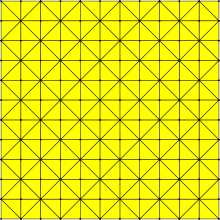Tetrakis square tiling
| Tetrakis square tiling | |
|---|---|
 |
|
| Type | Dual semiregular tiling |
| Faces | 45-45-90 triangle |
| Coxeter diagram |
|
| Symmetry group | p4m, [4,4], *442 |
| Rotation group | p4, [4,4]+, (442) |
| Dual polyhedron | Truncated square tiling |
| Face configuration | V4.8.8 |
| Properties | face-transitive |
In geometry, the tetrakis square tiling is a tiling of the Euclidean plane. It is a square tiling with each square divided into four isosceles right triangles from the center point, forming an infinite arrangement of lines. It can also be formed by subdividing each square of a grid into two triangles by a diagonal, with the diagonals alternating in direction, or by overlaying two square grids, one rotated by 45 degrees from the other and scaled by a factor of √2.
Conway calls it a kisquadrille, represented by a kis operation that adds a center point and triangles to replace the faces of a square tiling (quadrille). It is also called the Union Jack lattice because of the resemblance to the UK flag of the triangles surrounding its degree-8 vertices.
It is labeled V4.8.8 because each isosceles triangle face has two types of vertices: one with 4 triangles, and two with 8 triangles.
It is the dual tessellation of the truncated square tiling which has one square and two octagons at each vertex.
A 5 × 9 portion of the tetrakis square tiling is used to form the board for the Malagasy board game Fanorona. In this game, pieces are placed on the vertices of the tiling, and move along the edges, capturing pieces of the other color until one side has captured all of the other side's pieces. In this game, the degree-4 and degree-8 vertices of the tiling are called respectively weak intersections and strong intersections, a distinction that plays an important role in the strategy of the game. A similar board is also used for the Brazilian game Adugo, and for the game of Hare and Hounds.
...
Wikipedia
